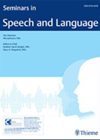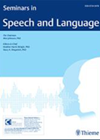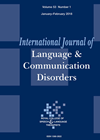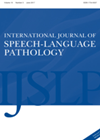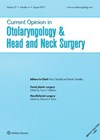
Journal Reviews
Counting up discourse
Speech and language researchers and health professionals alike strive to measure communication abilities using relevant and psychometrically sound tools. Discourse measures are potential tools which reflect everyday communication more accurately than other more traditional measures. However, time has been a...
Back to the future: aphasia therapy post stroke
When speech and language therapist first started working with people with stroke-related aphasia, they employed a general stimulation approach, the same with every patient they met. In the '70s this changed, and a more tailored approach was developed whereby therapists...
Bright young things: executive functioning in younger, older and aphasic people
Executive function comprises several higher order cognitive processes such as planning, organisation, adaptation, maintenance, monitoring and decision making. It is thought that difficulties in cognitive flexibility in people with aphasia are associated with difficulties in executive function rather than the...
Doing it for the people: how to do speech and language therapy
This review article distils 58 studies, collating information from people with aphasia, their families and clinical speech and language therapists summarising the seven habits of highly effective aphasia therapists. Habit 1: Effective therapists invest time in and prioritise relationships with...
More than words: looking at all the evidence
Evidence based practice (EBP) is a three-pillared approach whereby information on the research evidence, factors relating to the patient and clinical experience are all considered to inform a care decision. Unfortunately, there is frequently very little research evidence to inform...
Bespoke is best for children with communication difficulties
Children with communication difficulties can benefit from augmentative alternative communication (AAC) aids to support them in daily interaction, as well as in developing milestones. One of the most difficult aspects of choosing a device is not only meeting the child’s...
Humour to improve clinician - patient interactions
This study examined the role of humour employed by the speech language graduate student during their one-on-one therapy sessions with people with aphasia (PWA). The students used humour to soften the errors made by the clients; to equalise interactional power;...
Tell me like it is: advice for relatives of people with aphasia
More than a quarter of people who have a stroke present with aphasia immediately post-stroke (approx. 30%) and of these, around 60% experience chronic communication difficulties. Provision of information is seen as one of the top 10 best practice recommendations...
Do you really like me? Is it, Is it therapy?
Therapeutic alliance describes what happens in the interactions and relationships between the client and the therapist. There is evidence from mental health literature that a therapeutic alliance can have a significant impact on outcomes. A negative alliance can lead to...
Home alone with aphasia
Relationships and social networks are known to impact outcome following a stroke. Studies have shown that group-housed animals who have had a stroke show greater neurological recovery than those who are isolated. Similarly, adults who are socially isolated following a...
Can you hear the speech disorder?
Dysarthria is often the first or most pronounced feature of a Parkinson’s disease (PD) presentation, yet may be difficult to discern from normal ageing changes that impact voice and speech. Thus, it is important to be able to differentiate in...
Management of frontal sinus fractures
Frontal sinus fractures are uncommon (associated with around 5-15% of facial fractures). The authors divide frontal sinus fractures into isolated anterior table fractures, fractures involving the frontal sinus outflow tract and posterior table fractures, discuss some of the recent relevant...

